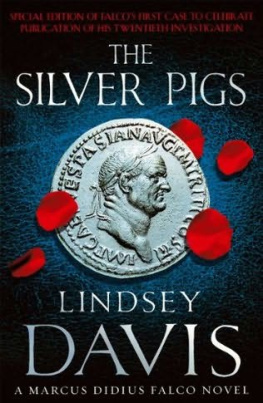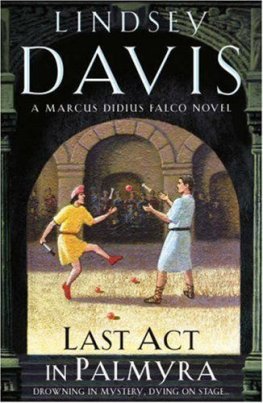Lindsey Davis - Enemies at Home
Here you can read online Lindsey Davis - Enemies at Home full text of the book (entire story) in english for free. Download pdf and epub, get meaning, cover and reviews about this ebook. genre: Detective and thriller. Description of the work, (preface) as well as reviews are available. Best literature library LitArk.com created for fans of good reading and offers a wide selection of genres:
Romance novel
Science fiction
Adventure
Detective
Science
History
Home and family
Prose
Art
Politics
Computer
Non-fiction
Religion
Business
Children
Humor
Choose a favorite category and find really read worthwhile books. Enjoy immersion in the world of imagination, feel the emotions of the characters or learn something new for yourself, make an fascinating discovery.
- Book:Enemies at Home
- Author:
- Genre:
- Rating:4 / 5
- Favourites:Add to favourites
- Your mark:
- 80
- 1
- 2
- 3
- 4
- 5
Enemies at Home: summary, description and annotation
We offer to read an annotation, description, summary or preface (depends on what the author of the book "Enemies at Home" wrote himself). If you haven't found the necessary information about the book — write in the comments, we will try to find it.
Enemies at Home — read online for free the complete book (whole text) full work
Below is the text of the book, divided by pages. System saving the place of the last page read, allows you to conveniently read the book "Enemies at Home" online for free, without having to search again every time where you left off. Put a bookmark, and you can go to the page where you finished reading at any time.
Font size:
Interval:
Bookmark:
Lindsey Davis
Enemies at Home
ROME, the Esquiline Hill: June AD89
1
Even before I started, I knew I should say no.
There are rules for private informers accepting a new case. Never take on clients who cannot pay you. Never do favours for friends. Dont work with relatives. Think carefully about legal work. If, like me, you are a woman, keep clear of men you find attractive.
The Aviola inquiry broke every one of those rules, not least because the clients had no money, yet I took it on. Will I never learn?
One warm, starry June night in the city of Rome, burglars invaded a ground-floor apartment on the Esquiline Hill. A large quantity of fine domestic silverware was taken, which people assumed was the primary target. The middle-aged couple who rented the fashionable suite had married only recently, which made what happened to them more poignant. After the robbers left, their bodies were found on the marital bed, amid signs of violent struggle. Both had been strangled.
The dead couple were wealthy enough to merit an investigation, a privilege that was generally thought too good for the poor, though it was normally available to victims who had left behind influential friends, as was the case here. Enquiries were first assigned to a vigiles officer, Titianus of the Second Cohort. In fairness, Titianus was no more inept than most vigiles. He knew that two plus two made four unless he happened to be preoccupied with watching a good cockfight, when he might inadvertently say five. But he had a decent record of arresting pickpockets in the Market of Livia. For about two hours he even thought that trying to solve a double murder was exciting. Then reality set in.
Titianus found it impossible to identify the thief or thieves. After asking around a bit, he turned his attention to the household, declaring that this must be an inside job. Inevitably his gaze fell on the owners freedmen and slaves. The freedmen were mature, articulate and well organised; that was how they had managed to gain their liberty and how they now bamboozled Titianus. The slaves were more vulnerable: younger and naive, or else older and plain dim. Nobody ever said any of them had threatened their master and mistress, but to a law officer in Rome any culprits were better than none and with slaves no real proof was necessary. They could be accused, tortured, prosecuted and executed on simple probability. Titianus put on a clean tunic to look good, then went and announced to his cohort tribune that he had the answer. The slaves did it.
The slaves got wind of their plight. They knew the notorious Roman law when a head of household was murdered at home. By instinct the authorities went after the wife, but that was no use if she was dead too. So unless the dead man had another obvious enemy, his slaves fell under suspicion. Whether guilty or not, they were put to death. All of them.
The good thing about such systematic capital punishment, occurring in public of course, was that it helped make other slaves, of whom there were hundreds of thousands in Rome, more well behaved. The proportion of masters to slaves was very small so nobody wanted this big slave population to get the idea of staging a rebellion. In our city it had been decided not to dress slaves in any distinguishing way, because then they might realise the power of their own numbers.
Many owners lived in constant fear of slaves turning against them. You cannot batter loyalty into a sullen, captive foreigner and neither can you even guarantee that kindly treatment will gain their gratitude. In Rome, executing slaves who betrayed their masters was extremely popular therefore. At least it was among the slave-owning classes.
Terrified, and with good reason, some of the accused slaves bolted from the elegant Esquiline house and took refuge a distance away at the Temple of Ceres. By tradition, this monument on the Aventine Hill offered a haven for refugees. They could claim sanctuary, be kept safe and even hope to be fed.
In theory, the authorities fostered the great temples famous role as a focus of liberty and protector of the desperate. However, nobody wants to take fine ideals too far.
In a swift, panic-stricken meeting just after dawn, the issue of how to get rid of the fugitives was handed to a magistrate whose duties gave him close connections to the temple. His name was Manlius Faustus, one of that years plebeian aediles, and I knew him. I liked his methods. He always stayed calm.
Charged with solving the problem, Faustus solemnly agreed with the Temple of Ceres authorities that it was important to take the correct action. This situation could easily turn ugly. They wanted to avoid censure. The public were shouting for a solution, preferably bloody. The Daily Gazette had already asked for a quotable comment and was about to feature the story in its scandal section; publication would fire lurid Forum gossip. The unseen eye of the emperor was probably on the Temple. Faustus had been handed a rather hot platter here.
As this dutiful man tried to come up with ideas, he walked to a bar called the Stargazer. There, while he pondered the meagre choice for breakfast, he ran into me.
2
I had seen the aedile coming always a good idea with magistrates who can impose large fines. Anyone who runs a market stall, anyone with a pavement outside their premises, anyone whose profession is heavily regulated (any prostitute, for instance), loathes aediles. Informers like me avoid them. My relatives who ran the Stargazer would not thank him for eating there, given that part of his job was the regulation of bars. They would not thank me either. They would think he had chosen it because he knew it was my local.
I had first met Faustus a few weeks before, working jointly on an investigation and sometimes putting our heads together in this very caupona. I had known him to go about in disguise, though not today. He was a solid man in his mid-thirties, who came down the drab street with a steady tread. He had no flashy train of attendants, relying on his purple-striped tunic to deter trouble-makers. Aediles were not given bodyguards. They were sacrosanct, protected by religious laws. Besides, he was obviously tough; even when he was preoccupied, Faustus looked as if he punched his weight. That was assuming people even noticed him; he was not the kind of official who made a lot of noise wherever he went.
He cannot have expected to see me sitting at a table. He thought I was with my family at our villa on the coast, though I had recently come back to Rome because I was tired of sun, sand and fishing expeditions. Before anyone wonders, I was not hankering for Faustus. I might be a fancy-free widow, but a magistrate was way out of my league.
Flavia Albia!
Manlius Faustus.
Formal name terms. After he ordered a bread roll with Lucanian sausage, the Stargazers only deal that morning (or any morning), he took a seat at my table, though he asked permission first.
Mind if I join you?
Always a pleasure.
Good to see you.
You too, aedile.
Play acting. We were both unsure. The last time we met, I made embarrassing advances, which Faustus sensibly rejected. Despite my gaffe, the aedile had expressed a hope we might work together again. Being polite, I thought. Still, here he was in my aunts horrible bar.
Manlius Faustus had responsibilities for neighbourhood law and order fair trading, clean streets, quiet baths and decorous brothels. I knew he was currently advising magistrates in other districts too, as they tackled a rash of random street killings that were happening throughout Rome. We lived in troubled times. The Vesuvius calamity, a decade ago but still vivid in the memory, had shaken people. We now had a paranoid emperor, who at just short of forty was still young enough to inflict many years of dread upon us. Our empires borders regularly came under attack from barbarians, so there was constant unsettling military talk. The city was also full of bitter satirists, outlawed philosophers and pouting poets who had failed to win prizes. In this climate all kinds of madness flourished.
Font size:
Interval:
Bookmark:
Similar books «Enemies at Home»
Look at similar books to Enemies at Home. We have selected literature similar in name and meaning in the hope of providing readers with more options to find new, interesting, not yet read works.
Discussion, reviews of the book Enemies at Home and just readers' own opinions. Leave your comments, write what you think about the work, its meaning or the main characters. Specify what exactly you liked and what you didn't like, and why you think so.

















